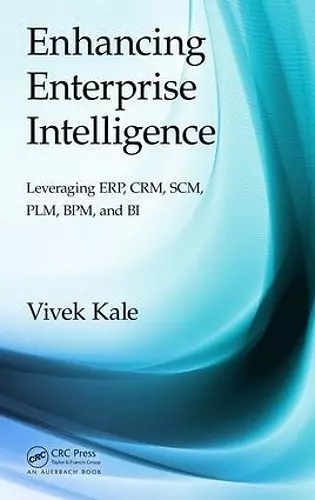Enhancing Enterprise Intelligence: Leveraging ERP, CRM, SCM, PLM, BPM, and BI
Format:Hardback
Publisher:Taylor & Francis Inc
Published:19th Feb '16
Currently unavailable, and unfortunately no date known when it will be back

Enhancing Enterprise Intelligence: Leveraging ERP, CRM, SCM, PLM, BPM, and BI takes a fresh look at the benefits of enterprise systems (ES), focusing on the fact that ES collectively contribute to enhancing the intelligence quotient of an enterprise. The book provides an overview of the characteristic domains (i.e., business functions, processes, and activities) addressed by the various categories of ES, namely, ERP, CRM, SCM, PLM, BPM, and BI.
The book begins with an overview of agile enterprises and dimensions of intelligent enterprises. The middle chapters detail CRM’s decisive concept of customer centricity, SCM's differentiating concept of customer responsiveness, and PLM's stupendous transformative potential for renewing the enterprise along with the establishment of a collaborative enterprise with BPM and enterprise BPM methodology.
The latter chapters deal with the realization of an informed enterprise with BI coupled with the novel concept of decision patterns. The author highlights the fact that any end-user application’s effectiveness and performance can be enhanced by transforming it from a bare transaction to one clothed by a surrounding context formed from an aggregate of all relevant past decision patterns. The final chapter examines various aspects relating to a successful ES implementation project, and the appendix provides an overview of the SAP Business Suite to give you a practical context to the discussions presented in the book.
"Vivek Kale’s book, Enhancing Enterprise Intelligence, de-mystifies the latest advances in information technology applied to enterprises in today's supply chain networks-oriented markets. While the book features the SAP Business Suite in the appendix, in the main body of the book the author clearly describes the purpose and implications of integrating Enterprise Resources Planning (ERP) with Customer Relationship Management (CRM) with Supply Chain Management (SCM) with Product Lifecycle Management (PLM) with Business Process Management (BPM) and with Business Intelligence (BI). The author writes from an end-customer centric perspective of the competitiveness that networks of processes driven by extraordinary information intelligence can provide. Upon reading this book, it is terribly exciting to realize that today the technology supports dynamic linkages of different business processes that can be tailored in real time for specific customer-product pairs; that the technology supports the identification of information patterns to be used for making business decisions about which customers are most profitable and open to buying increasingly customized new products; that the technology can deliver accurate, synchronized, real-time intelligence from multiple sources crossing corporate and national boundaries in support of time-driven competition; that the technology enables an architecture that is scalable in multiple dimensions with the growth in business; and, finally, that the only real constant in today's supply chain networks-oriented markets may be information itself because information has become a tangible resource!"
...William T. Walker, CFPIM, CIRM, CSCP, Adjunct professor of supply chain engineering at NYU Polytechnic School of Engineering, author of Supply Chain Construction
ISBN: 9781498705974
Dimensions: unknown
Weight: 680g
360 pages